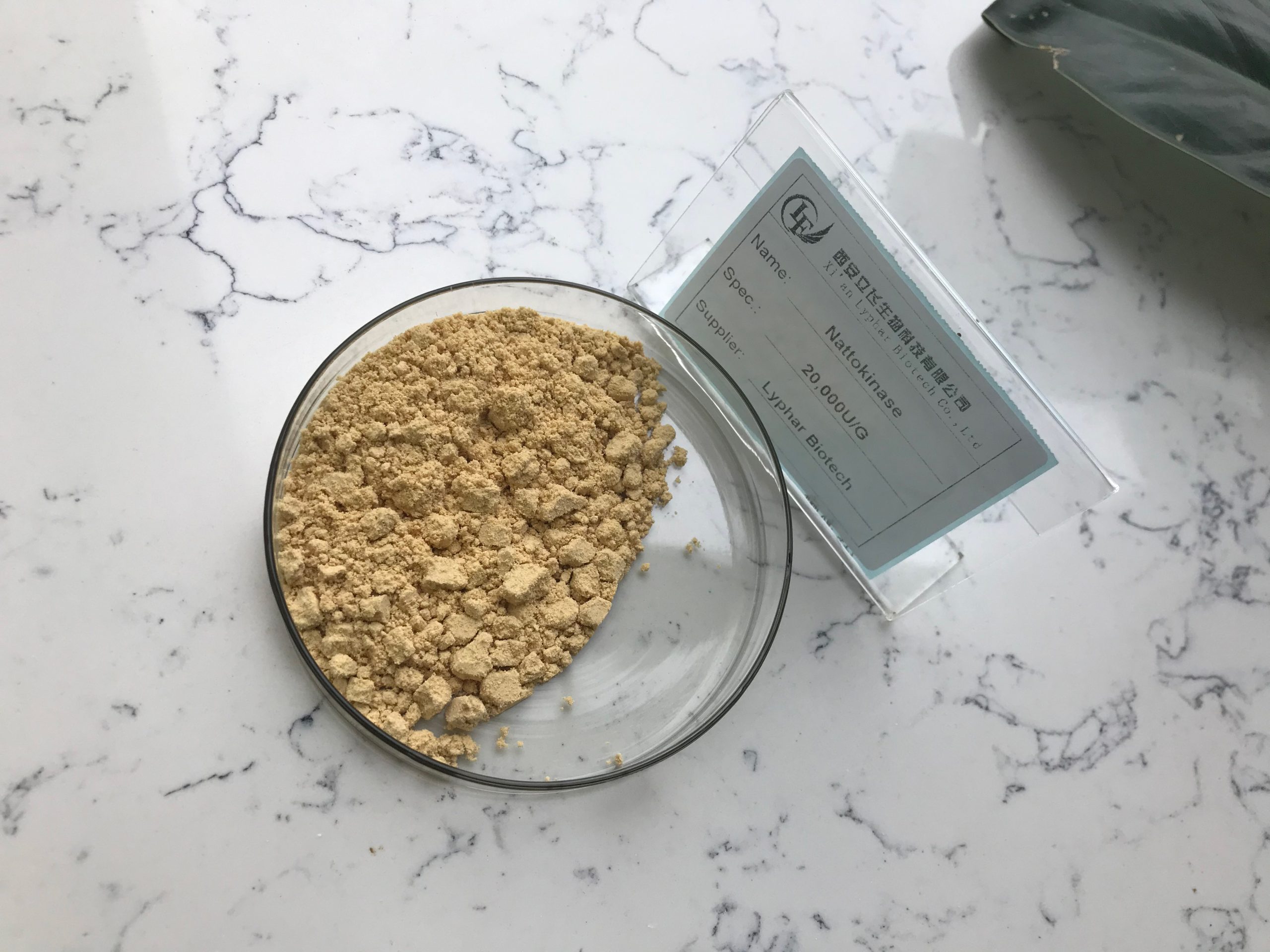Nattokinase is an enzyme that is derived from natto, a traditional Japanese food made from fermented soybeans. This enzyme has gained attention for its potential health benefits, particularly in relation to cardiovascular health and blood clotting. However, it’s essential to note that while some studies suggest positive effects, more research is needed to establish definitive conclusions.
Applications of Nattokinase
1.Blood Clot Prevention: Nattokinase is believed to have fibrinolytic activity, meaning it may help dissolve blood clots. This property has led to its exploration as a natural alternative or complementary therapy for conditions related to blood clot formation, such as deep vein thrombosis (DVT) and cardiovascular diseases.
2.Cardiovascular Health: Some research suggests that nattokinase may contribute to cardiovascular health by promoting healthy blood circulation and reducing the risk of blood vessel-related conditions, such as hypertension and atherosclerosis. It may also have potential in managing conditions like angina and stroke.
3.Blood Pressure Regulation: Studies have indicated that nattokinase may have a blood pressure-lowering effect, possibly due to its ability to improve blood vessel function and enhance circulation. This makes it a subject of interest for individuals looking to manage hypertension.
4.Improved Circulation: Nattokinase is thought to enhance blood flow by breaking down fibrin, a protein involved in the formation of blood clots. Improved circulation may benefit overall cardiovascular health and reduce the risk of related issues.

5.Anti-Inflammatory Properties: Some research suggests that nattokinase may have anti-inflammatory effects, which could be beneficial for conditions associated with chronic inflammation.
6.Joint Health: Due to its potential anti-inflammatory properties, nattokinase might be explored for its role in supporting joint health, particularly in conditions like arthritis.
It’s important to note that while there is some promising research on nattokinase, more extensive clinical studies are needed to fully understand its efficacy and safety. Before using nattokinase or any supplement, it’s advisable to consult with a healthcare professional, especially if you have pre-existing medical conditions or are taking other medications. Additionally, dietary supplements are not regulated in the same way as pharmaceuticals, so quality and potency can vary among products.
The negative impact of the Nattokinase
Nattokinase is an enzyme derived from natto, a traditional Japanese food made from fermented soybeans. It is often promoted for its potential health benefits, particularly its ability to support cardiovascular health by preventing blood clots. However, like any supplement or natural remedy, there can be potential negative impacts or side effects associated with the use of nattokinase. It’s essential to note that individual responses may vary, and consulting with a healthcare professional before adding any new supplement to your routine is advisable.
Here are some potential negative impacts or considerations associated with nattokinase:
1.Blood Thinning Effects: Nattokinase has anticoagulant properties, meaning it may act as a blood thinner. While this can be beneficial for some people, it may pose a risk for those already taking prescription blood-thinning medications or individuals with bleeding disorders. Combining nattokinase with other anticoagulant drugs without proper medical supervision can increase the risk of bleeding.
2.Interactions with Medications: Nattokinase may interact with certain medications, including anticoagulants, antiplatelet drugs, and drugs that affect blood pressure. It’s crucial to inform your healthcare provider about all supplements you are taking to avoid potential interactions.
3.Allergic Reactions: Some individuals may be allergic to soy, and since nattokinase is derived from fermented soybeans, it could trigger an allergic reaction in susceptible individuals. Allergic reactions may include itching, swelling, or difficulty breathing.
4.Digestive Issues: In some cases, people may experience mild digestive issues such as bloating or stomach discomfort when taking nattokinase. This can vary from person to person.

5.Pregnancy and Breastfeeding: There is limited research on the safety of nattokinase during pregnancy and breastfeeding. Pregnant or breastfeeding women should consult with their healthcare provider before using nattokinase to ensure it is safe for them and their baby.
6.Quality and Purity Concerns: The quality of nattokinase supplements can vary between products. Contaminants or impurities in poorly manufactured supplements could potentially cause adverse effects. It’s important to choose a reputable brand and follow recommended dosage guidelines.
As with any supplement or natural remedy, moderation and caution are key. If you are considering using nattokinase for its potential health benefits, it’s advisable to consult with a healthcare professional to discuss your individual health status, potential interactions with medications, and any concerns you may have.
